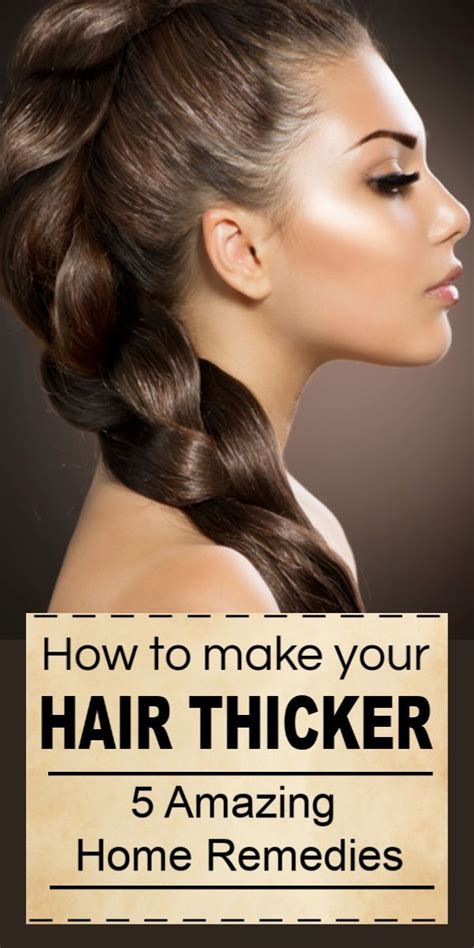How To Make Your Hair Thicker: A Comprehensive Guide
Thinning hair can be a frustrating experience, but thankfully, there are many things you can do to improve its thickness and overall appearance. This comprehensive guide explores various methods, from lifestyle changes to specific hair care products, to help you achieve fuller, healthier-looking hair.
Understanding Hair Thickness
Before diving into solutions, it's crucial to understand what influences hair thickness. Genetic predisposition plays a significant role, determining the size and number of hair follicles you have. However, several external factors can also impact hair thickness, including:
- Diet: Nutritional deficiencies can lead to hair thinning. A balanced diet rich in protein, vitamins (especially biotin and vitamin D), and minerals is essential for healthy hair growth.
- Stress: Chronic stress can disrupt the hair growth cycle, leading to shedding and thinner hair.
- Hormonal imbalances: Fluctuations in hormones can affect hair thickness. Conditions like PCOS (Polycystic Ovary Syndrome) can contribute to hair loss.
- Hair care practices: Harsh chemicals, excessive heat styling, and tight hairstyles can damage hair, making it appear thinner.
- Medical conditions: Certain medical conditions, such as alopecia areata, can cause significant hair loss.
Lifestyle Changes for Thicker Hair
Making positive lifestyle adjustments can significantly impact hair thickness and overall health. Here are some key areas to focus on:
1. Nutrition for Hair Growth:
- Protein: Prioritize lean protein sources like chicken, fish, beans, and lentils. Protein is a building block of hair.
- Biotin: Found in eggs, nuts, and sweet potatoes, biotin is crucial for hair growth and strength.
- Vitamin D: Essential for hair follicle cycling. Get sufficient sun exposure or consider a supplement (consult your doctor).
- Iron: Iron deficiency is a common cause of hair loss. Include iron-rich foods like spinach and red meat in your diet.
- Zinc: Important for hair tissue growth and repair. Good sources include oysters, pumpkin seeds, and lentils.
2. Stress Management Techniques:
Chronic stress wreaks havoc on your body, including your hair. Incorporate stress-reducing activities into your routine:
- Yoga and Meditation: These practices promote relaxation and reduce stress hormones.
- Regular Exercise: Physical activity helps manage stress and improves overall health.
- Sufficient Sleep: Aim for 7-9 hours of quality sleep per night.
Hair Care Practices for Thicker Hair
Your hair care routine significantly impacts its thickness and appearance. Here's how to optimize it:
1. Gentle Hair Washing:
- Avoid harsh sulfates: These can strip your hair of its natural oils, leading to dryness and breakage. Opt for sulfate-free shampoos.
- Condition Regularly: Use a good conditioner to hydrate and strengthen your hair.
- Limit Washing Frequency: Over-washing can strip your hair of its natural oils, making it look thinner.
2. Heat Styling and Protective Measures:
- Minimize Heat Styling: Excessive heat damages hair, making it brittle and prone to breakage.
- Use Heat Protectant Sprays: If you must use heat styling tools, always apply a heat protectant spray beforehand.
- Air Dry Whenever Possible: Let your hair air dry as often as possible to minimize heat damage.
3. Choosing the Right Hair Products:
- Volumizing Shampoos and Conditioners: These products can add body and lift to your hair, making it look thicker.
- Hair Growth Serums: Some serums contain ingredients that may stimulate hair growth.
- Avoid Heavy Products: Heavy styling products can weigh your hair down, making it appear thinner.
When to Seek Professional Help
If you're experiencing significant hair loss or thinning, consult a dermatologist or trichologist. They can diagnose the underlying cause and recommend appropriate treatment options, which might include medications or other therapies.
Conclusion
Achieving thicker, healthier hair requires a holistic approach encompassing lifestyle changes, proper hair care, and, when necessary, professional medical advice. By incorporating the tips outlined in this guide, you can take significant steps towards fuller, more vibrant hair. Remember, consistency is key. Be patient and persistent, and you'll see results over time.
